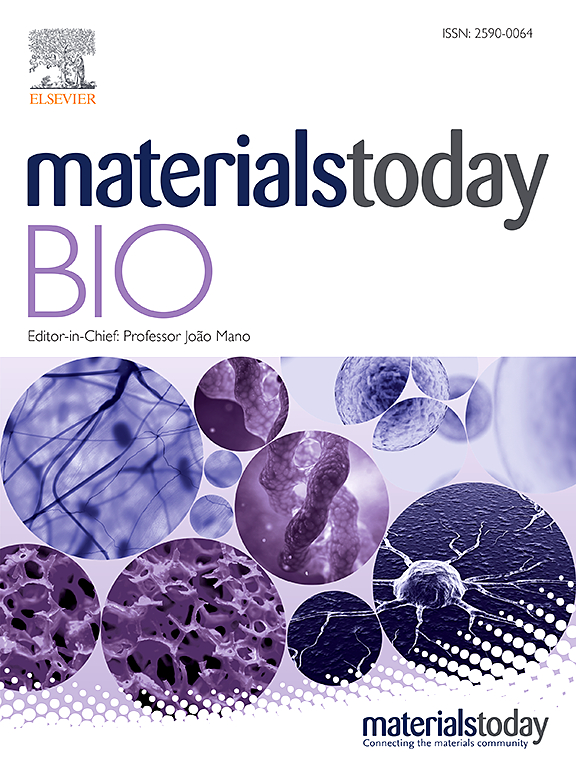Double-targeted liposomes coated with matrix metallopeptidase-2-responsive polypeptide nanogel for chemotherapy and enhanced immunotherapy against cervical cancer
IF 8.7
1区 医学
Q1 ENGINEERING, BIOMEDICAL
引用次数: 0
Abstract
Immunotherapy is a cornerstone in cancer treatment, celebrated for its precision, ability to eliminate residual cancer cells, and potential to avert tumor recurrence. Nonetheless, its effectiveness is frequently undermined by the immunosuppressive milieu created by tumors. This study presents a novel nanogel-based drug delivery system, DOX-4PI@CpG@Lipo@Gel (DPCLG), engineered to respond to Matrix Metallopeptidase-2 (MMP-2)—a protease abundant in the tumor microenvironment (TME). This system enables the controlled release of two distinct types of liposomes within the TME. The first, DOX-4PI@Liposome (DPL), carries doxorubicin (DOX) and 4-phenylimidazole (4PI), targeting cancer cells to provide chemotherapeutic effects while diminishing the immunosuppressive environment. The second, a mannosyl-modified cationic liposome (CL), is loaded with Cytosine phosphate guanine (CpG) oligodeoxynucleotides to specifically target M2 phenotype macrophages, reversing their tumor-associated phenotype (TAM) and activating immune cytokines to promote tumor destruction. Our findings indicate that DPCLG significantly curtails tumor growth, both in vitro and in vivo, mitigates the immunosuppressive TME, and triggers a potent systemic immune response. This study underscores the potential of DPCLG as an advanced, dual-targeting drug delivery system for comprehensive cancer therapy.

基质金属肽酶-2反应性多肽纳米凝胶包被双靶向脂质体用于宫颈癌化疗和增强免疫治疗。
免疫疗法是癌症治疗的基石,以其精确性、消除残留癌细胞的能力和避免肿瘤复发的潜力而闻名。尽管如此,它的有效性经常被肿瘤产生的免疫抑制环境所破坏。本研究提出了一种新型纳米凝胶为基础的药物递送系统DOX-4PI@CpG@Lipo@Gel (DPCLG),设计用于响应肿瘤微环境(TME)中丰富的基质金属肽酶-2 (MMP-2)蛋白酶。该系统能够在TME内控制两种不同类型的脂质体的释放。第一种药物DOX-4PI@Liposome (DPL)携带多柔比星(DOX)和4-苯基咪唑(4PI),靶向癌细胞提供化疗效果,同时减少免疫抑制环境。第二种是甘露糖基修饰的阳离子脂体(CL),它装载胞嘧啶磷酸鸟嘌呤(CpG)寡脱氧核苷酸,特异性靶向M2型巨噬细胞,逆转其肿瘤相关表型(TAM),激活免疫细胞因子,促进肿瘤破坏。我们的研究结果表明,DPCLG在体外和体内均能显著抑制肿瘤生长,减轻免疫抑制性TME,并引发有效的全身免疫反应。这项研究强调了DPCLG作为一种先进的双靶向给药系统用于综合癌症治疗的潜力。
本文章由计算机程序翻译,如有差异,请以英文原文为准。
求助全文
约1分钟内获得全文
求助全文
来源期刊

Materials Today Bio
Multiple-
CiteScore
8.30
自引率
4.90%
发文量
303
审稿时长
30 days
期刊介绍:
Materials Today Bio is a multidisciplinary journal that specializes in the intersection between biology and materials science, chemistry, physics, engineering, and medicine. It covers various aspects such as the design and assembly of new structures, their interaction with biological systems, functionalization, bioimaging, therapies, and diagnostics in healthcare. The journal aims to showcase the most significant advancements and discoveries in this field. As part of the Materials Today family, Materials Today Bio provides rigorous peer review, quick decision-making, and high visibility for authors. It is indexed in Scopus, PubMed Central, Emerging Sources, Citation Index (ESCI), and Directory of Open Access Journals (DOAJ).
 求助内容:
求助内容: 应助结果提醒方式:
应助结果提醒方式:


